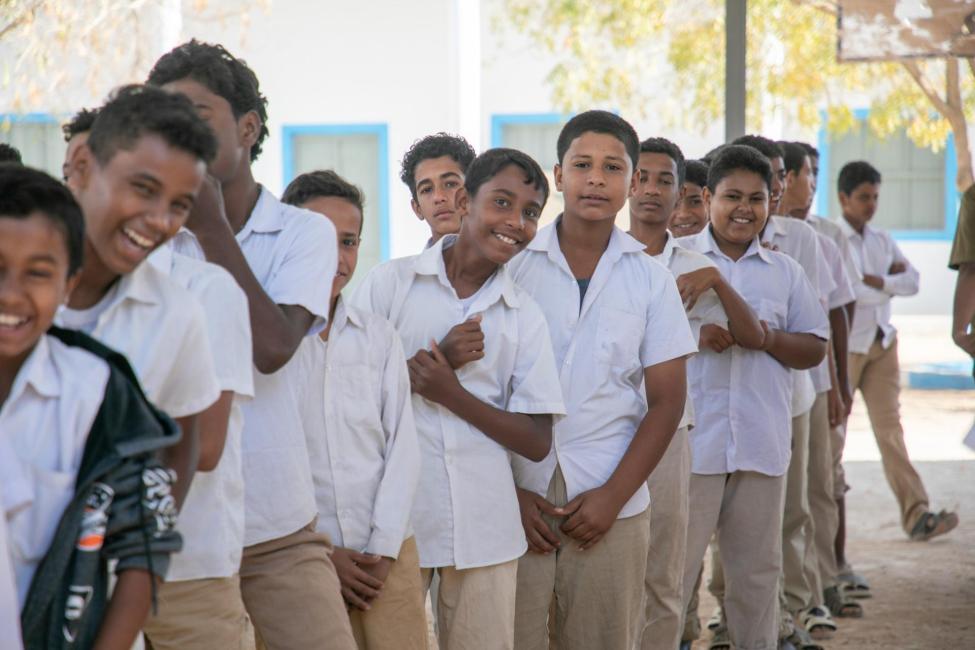-
Who we are
WHO WE AREIOM is the leading inter-governmental organization promoting humane and orderly migration for the benefit of all, with presence in over 100 countries. IOM has been active in the Middle East and North Africa from the early 1980s.
About
About
IOM Global
IOM Global
-
Our Work
Our WorkAs the leading inter-governmental organization promoting since 1951 humane and orderly migration, IOM plays a key role to support the achievement of the 2030 Agenda through different areas of intervention that connect both humanitarian assistance and sustainable development. Across the Middle East and North Africa region, IOM supports States in realizing their national priorities and in fulfilling their international commitments in the areas of migration, displacement and mobility.
Cross-cutting (Global)
Cross-cutting (Global)
- Where we work
- Take Action
- Data and Resources
- 2030 Agenda
Hadramawt – Ammar Bin Yasser School opened its doors to primary school students in Hadramawt in 1988. When the conflict began in Yemen seven years ago, the population in the area increased as families living in areas affected by the conflict fled to this more secure part of the country.
The school quickly became overcrowded with students seeking refuge here – its ten classrooms were packed, and many students were studying in the open yard under the hot sun with temperatures reaching up to 45 degrees Celsius.
“We were only able to study in the school for a few days every week as some days were reserved for boys and others for girls,” said Fatima, a ninth-grade student in Ammar Bin Yasser.
“The restrooms were either closed or had no running water. All the desks were worn out and full of holes that distorted our handwriting and destroyed our notebooks,” she continued.
Sameer is the principal of the school and remembers studying on this same plot of land decades previously.
“Like many schools in the area, Ammar Bin Yasser School was originally a mudbrick building and used to only teach up to sixth grade,” said Sameer.
He is proud of the progress the school has made to better educate students in the community but laments the impact that years of conflict have had on the education system in Yemen, and on his school.
Across the country, almost 3,000 schools have been destroyed or damaged due to conflict, and millions of children are out of school.
“We had been struggling to provide students with quality education and suitable learning environments. We felt helpless, like our hands were tied.”
To improve access to safe and accessible learning environments in Hadramawt, the International Organization for Migration (IOM) and the King Salman Humanitarian Aid and Relief Centre (KSrelief) rehabilitated four schools in Hadramawt.
More than 3,700 students in Hadramawt now have access to improved education at four schools that IOM has rehabilitated with the support of KSrelief – over 2,000 of these students are girls.
At Ammar Bin Yasser School, construction and rehabilitation work began with fixing the crumbling roofs and walls, repairing all windows and doors, and renovating the school façade. In addition, eight restrooms were built, a shaded covering in the schoolyard was installed and better equipment was provided.
As part of the intervention, teachers attended workshops that provided them with new skills that have equipped them with greater knowledge on supporting their students, as well as on proper hygiene promotion.
The construction and rehabilitation of Ammar Bin Yasser has helped Fatima and her friends to go to school regularly and provided them with a unique opportunity to attend secondary school as there are no other high schools in the area.
“This school stands up for women’s development. Girls here are motivated to pursue high school and university education,” said Sameer.
“We also welcome women who decided to return to school after leaving for a few years. This way women of different ages can get an education, secure better jobs and become mothers who raise educated children.”
“Building new classrooms has created an improved environment for learning for students and has a positive impact on the educational process in general,” said Sameer.
Authors: Elham Al Oqabi – IOM Yemen communication Assistant




